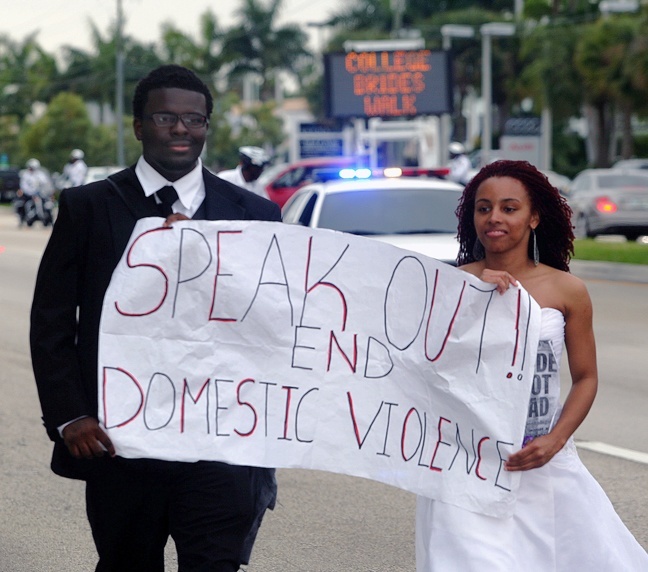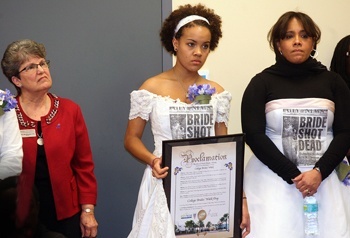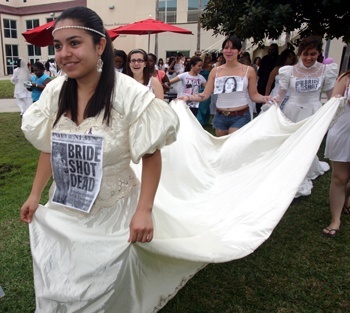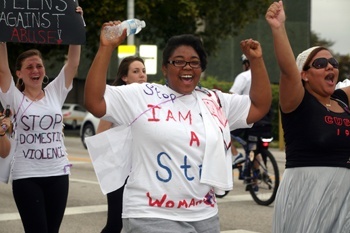By Marlene Quaroni - Florida Catholic

Photographer: MARLENE QUARONI | FC
Two marchers arriving at 151st St., North Miami, where they would turn around and march back to Barry University, participate in the walk wearing a bridal gown and tuxedo to bring awareness to the evils of domestic and dating violence.

Photographer: MARLENE QUARONI | FC
Barry University President Sister Linda Bevilacqua, Stephanie Wong, 17, holding a proclamation declaring Friday, Feb. 11, as College Bride's Walk Day, and Josie Ashton (Stephanie's mother), a victim's advocate, listen to the North Miami police chief address the audience before the Bride's Walk. North Miami Mayor Andre Pierre had just presented the proclamation to Sister Bevilacqua.
Her walk a decade ago inspired 300 college students wearing wedding gowns and tuxedos to march 7.5 miles in a College Bride's Walk Feb. 11. Complete with police escort, the students walked from Barry University in Miami Shores to Florida International University's Biscayne Bay Campus and back to raise awareness of domestic violence. Students attended from Barry, FIU, and Johnson and Wales.
Before the walk, the students listened to talks by the event organizers, local officials, and domestic violence victims.
"Ten years ago I walked alone; today, I am not alone," said Ashton. "Being a domestic violence survivor who grew up in a violent home, I want to make everyone aware of this problem. The main source of my inspiration is my two daughters."

Photographer: MARLENE QUARONI | FC
Carolina Martinez, a Barry student, waits for marchers to leave Barry University for the 7.5 mile walk.
"I will always remember Gladys Ricart's beautiful smile and the sound of the gun taking her life," said Ashton.
Ashton, 38, was a criminal justice major at Florida International University at the time of the murder in 1999.
"I received a vision from seeing that. I decided to walk from New Jersey to Miami to make people aware of domestic violence," Ashton said. "As it happens in many cases, everyone was blaming the victim, saying she brought on the attack herself because she was still communicating with her ex-boyfriend."
Along her walk in September 2001, Ashton stayed in 14 domestic violence shelters and visited 22 cities. Her walk inspired subsequent Bride’s Walks in New York, Wisconsin, Florida and Washington. South Florida walks have taken place in 2002, 2003, 2005 and 2008, when sufficient sponsors were involved. Barry University hosted its first Bride’s Walk this year.
Barry University President Sister Linda Bevilacqua said Barry was honored to host the event because the school has a commitment to social justice and community collaboration.
"We will do anything we can to educate, advance and preach against non-violence," she told the students. "With every step you take on this walk, be proud. You are raising awareness. You are advocating for the victims. Be proud you are helping to transform victims into survivors. Josie [Ashton] poignantly reminds us that one person can make a significant impact."
Karen Grae-Grabowski was among a group of survivors of domestic violence who told their stories in the Barry Student Union before and after the walk.

Photographer: MARLENE QUARONI | FC
Michelle Bolton, a Johnson and Wales University student, cheers on the cause of stopping domestic violence as she walks on N.E. 125th St., in North Miami
Grae-Brabowski said that abuse passes from generation to generation and must be stopped.
"This disease continues to grow in epidemic proportions," she said. "Children act out in their own intimate relationships. When I told my son, who was seven years old at the time, it was time to take a bath, he said 'No, I’m going to call my dad and he'll beat you up.'"
The victim is the one being stripped of her basic right to life, she said.
"We need to talk about this epidemic," said Grae-Grabowski. "We hide the shame. I’m here to tell you, I’m not ashamed anymore."
Johnson and Wales student Michelle Bolton walked the entire route back and forth and said she wasn't tired.
"Along the way, people were honking their horns for the cause," she said. "We received a lot of support."

